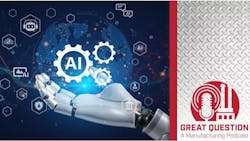Podcast: Generative AI on the plant floor
Below is an excerpt from the podcast:
IW: Aaron and Dale, I want to ask you about generative AI, specifically the large language models like open AI. How might they be deployed for many manufacturing operations directly on the plant floor, for example?
AM: So, we're a reliability-focused organization. If you think about the plant floor, you've got your maintenance technicians and you have your operators and the equipment. And what we see with our focus on reliability is the use of generative AI to address the skills shortages, to some extent labor shortages, but more importantly, the eroding of domain expertise and skills in industrial facilities.
See also: With AI, the time is now, say manufacturing technologists, futurist, 'evangelist'
And as Dale alluded to, creating copilot-like capabilities where you're able to take a relatively junior engineer or technician and through the kind of adaptive coaching and directions to them, have them perform much more of the complex maintenance tasks than perhaps they would be able to with just their limited amount of experience.
So, there's a bit of taking the graying workforce, somebody who's been working with machines for 20 or 30 years, and trying to codify that knowledge, either through looking backwards at the history of work orders performed on assets, or through more direct captive technologies and how they perform their work, create a baseline definition of how the guided work instructions should be provided to reliability engineers, but then make those instructions themselves.
I think the key part that is unique to generative AI capabilities that are coming out now is that ability to adapt in real time the type of instructions that you give. So, you may have an individual who, for example, constantly forgets that the bolt is left-hand threaded versus right-hand threaded.
Podcast: Accessing data and clearer paths to drive your digital transformation
So, for that individual, your work instructions and the coaching you're going to get is to remind them before they go strip the bolt that this is a left-handed one. Whereas, perhaps, you have somebody who's been there 10 years and they still perform the same maintenance routine, but they don't need that extra noise and distraction of being reminded of things.
I think the ability to codify deep domain expertise that has been in facilities, simplified and translated for individuals and personalized to make individual people much more productive is where we're seeing opportunity in the reliability space.
DT: I'm very excited about the direction that we're seeing generative AI and where AI can really take us in our manufacturing environments. And the example that Aaron gave relative to how you optimize, say, work instructions depending on the worker’s technical capabilities, maybe how often they've done that, I think that's a great area.
Podcast: How reshoring is changing U.S. manufacturing
One of the things I really want to talk about here is how Siemens’ work with AWS has really been democratizing access to AI and generative AI so that we can deploy it out to more people more quickly. And by bringing our expertise together, we're really helping customers scale up the implementation of some of this technology and transforming their businesses.
I think as we see this being deployed in the creation of work instructions, helping out with optimizing quality control processes, maybe even optimizing your plan that you laid out, we're trying to bring this capability to companies faster and on top of their existing solutions.
See also: Rockwell Automation gives AI its due
At CES, at the Consumer Electronics Show a few months ago, we announced this partnership with AWS to integrate the generative AI solutions from Amazon Bedrock into our Mendix low-code platform so that people can go in and bring some of these applications to the marketplace faster and to companies faster, building on their existing solutions, and they're extending it. So, the ability to have that, I think it's a real opportunity to really make it more accessible to a lot of our customers.
About the Author
Scott Achelpohl
Head of Content
I've come to Smart Industry after stints in business-to-business journalism covering U.S. trucking and transportation for FleetOwner, a sister website and magazine of SI’s at Endeavor Business Media, and branches of the U.S. military for Navy League of the United States. I'm a graduate of the University of Kansas and the William Allen White School of Journalism with many years of media experience inside and outside B2B journalism. I'm a wordsmith by nature, and I edit Smart Industry and report and write all kinds of news and interactive media on the digital transformation of manufacturing.





